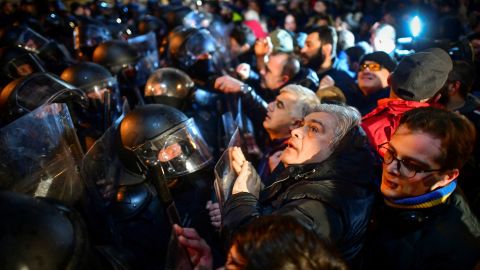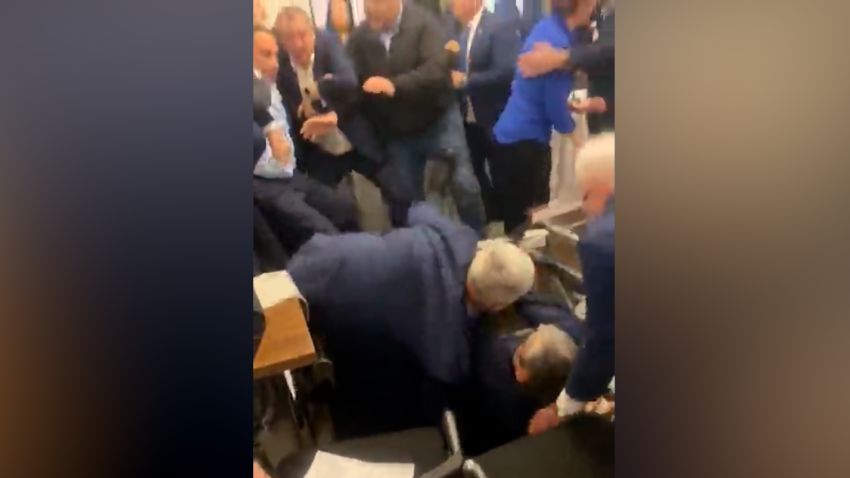London
CNN
—
Protests erupted in Tbilisi on Tuesday after Georgia’s parliament passed a controversial bill in its first reading that would require some organizations receiving foreign funding to register as “foreign agents”. Rights groups have criticized the law as restricting basic freedoms in the country.
The hearing was streamed live on the legislature’s website.
“76 votes for, 13 against. The bill passed the first reading,” Parliament Speaker Shalva Papuashvili said.
The bill needs to pass further readings in parliament to become law, but so far it appears to have broad support among Georgian lawmakers despite domestic and foreign criticism.
Thousands of protesters could be seen outside the parliament building on Tuesday evening, holding not only the Georgian flag but also flags of the European Union.
Some threw rocks and petrol bombs, while security forces responded with tear gas and water cannons. Video posted on social media also showed protesters storming a barricade at the entrance to the parliament building and tearing it down.
There are fears the law could hamper the country’s hopes of closer ties with the European Union.
Georgian President Salome Zurabishvili expressed her support for the protesters in a video message posted on Facebook, saying that “the path to European integration must be protected. Those who support this law today, all those who voted for this law today are violating the Constitution. All of them take us away from Europe,” she said.
She said she would repeal the law if it crossed his desk. However, the ruling Dream Party has the parliamentary majority to overcome a presidential veto, according to Human Rights Watch.
“I said on day one that I would veto this law, and I will,” Zurabishvili said in the video.

Georgia’s Interior Ministry has asked protesters to disperse, warning that “legal measures” will be taken to restore calm.
“The protest action near the Parliament building on Rustaveli Avenue in Tbilisi turned violent. The demonstrators tried to block one of the entrances to the parliament, and there are acts of violence against the employees of the ministry, ”reads a press release from the Ministry of the Interior.
Protesters’ chants, with insults aimed at both Georgian politicians and Russian President Vladimir Putin, underscore fears that the bill will follow the pattern of a controversial law in neighboring Russia that has already imposed restrictions and restrictions. stringent requirements for organizations and individuals with foreign ties.
President Zurabishvili called it “a useless law that did not come out of nowhere, but was dictated by Moscow”, telling protesters that she stood “beside you because you are the ones who represent free Georgia today”. Georgia which sees its future in Europe and will not let anyone take that future away from it.
The Georgian bill has been widely criticized as having a potential chilling effect on Georgian civil society, and in particular on NGOs and media outlets with links to Europe.

Politicians in this neighboring country of Russia want to pass a controversial law. A fight breaks out in parliament
Human Rights Watch and Amnesty International said the bill would hamper the rights to freedom of expression and association in the country with onerous financial reporting requirements.
“The ‘foreign agent’ bills seek to marginalize and discredit foreign-funded independent media and groups that serve the broader public interest in Georgia,” said Hugh Williamson, Europe and Central Asia Director at Human Rights Watch.
An EU statement warned on Tuesday that the law would be “incompatible with EU values and standards” and could have “serious repercussions on our relations”.
In February, US State Department spokesman Ned Price also said that “anyone who votes for this bill” could also jeopardize Georgia’s relations with Europe and the West.
The former Soviet republic played a balancing act between the pro-European sentiment of its citizens and its regional positioning alongside Russia. Former Russian President Dmitry Medvedev said in 2011 that if Russia had not invaded Georgia in 2008, NATO would have expanded into Georgia.
The invasion only lasted a few days, but it appeared to have the same pretext that Russian President Vladimir Putin used to invade Ukraine in 2014 and last year, writes the think tank European Council on Foreign Relations ( ECFR).
“Over the past few years, and particularly over the past 18 months, Georgia’s ruling coalition has taken a series of steps that appear designed to move the country away from the West and gradually shift it into the sphere of influence. of Russia,” writes the ECFR in a report. where he attributes much of the drift to the ruling Georgian Dream party.
